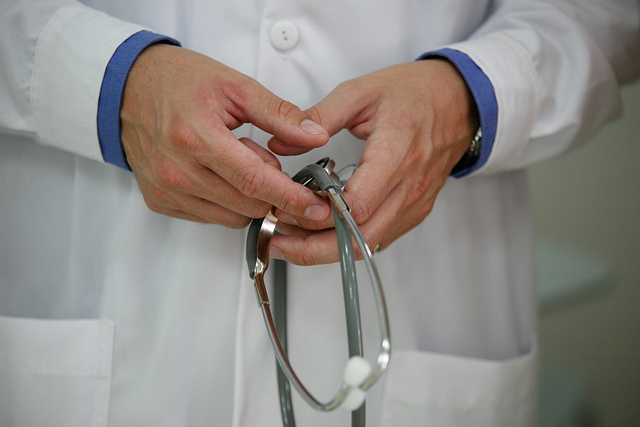Going to the médico (doctor) in Brazil Posted by Ester on Oct 5, 2015 in Culture, Learning, Vocabulary
Oi de novo pessoal!
Going to the doctor is never pleasant, having to do so in a different culture and language could be quite estressante (stressful). So here are some tips and vocabulary to help you out.
In some cultures it is quite common for people to go first to the General Practitioner, who will either treat you or advise you should seek a doctor specialized in what you might have. In Brazil, however, you only go to a GP in case you do not know what is wrong with you or if it is an emergency.
Let’s say you have a sore throat, you will go straight to a Otorrinolaringologista in Brazil, since they are specialised in throat, nose and ears. In case you have a back problem you will seek a Ortopedista and if you have a sore stomach, the Gastroenterologista is the doctor to go to. However, if you think you might have a cold or maybe you are feeling feverish, nauseated, faint, have a rash and other symptoms you will then seek a Clínico Geral (GP).
Some useful vocabulary:
- Calling to make an appointment:
- Eu gostaria de marcar uma consulta com um médico/clínico geral. (I would like to make an appointment to see a doctor/GP?)
- At the doctor’s office:
- Eu tenho uma consulta com o Dr. Connor às quatro horas. (I have an appointment to see Doctor Connor at four o’clock)
- Eu tenho uma consulta às quatro horas. (I have an appointment at 4 o’clock)
- Eu tenho seguro de saúde. (I have health insurance)
- Questions the doctor might ask:
- Como eu posso te ajudar? (How can I help you?)
- Qual seria o problema? (What seems to be the problem?)
- O que você está sentindo? (What are you feeling?)
- Quais são seus sintomas? (What are your symptoms?)
- Há quanto tempo você tem se sentido assim? (How long have you been feeling like this?)
- Tem alguma chance de você estar gravida? (Is there a chance you might be pregnant?)
- Você tem alguma alergia? (Do you have any allergies)
- Você está tomando algum medicamento? (Are you on any medication)
- Dói quando eu faço isso? (Does it hurt when I do this?)
- Symptoms
- Eu estou com febre (I feel feverish)
- Eu estou com… (I have…)
… dor de garganta (a sore throat)
… dor de cabeça (a headache)
…brotoejas; erupção cutânea (a rash)
…nariz escorrendo (a runny nose)
… nariz congestionado (a congested nose)
… enxaqueca (a migraine)
… alergia (allergies)
… alergia por mudança de estação, pólen (hay fever)
… um caroço na barriga (a lump on my stomach)
… dor no peito (a pain in my chest)
- Eu tenho diabetes (I have diabetes)
- Eu tenho asma (I have asthma)
- Eu estou coçando (It feels itchy)
- Eu estou com diarreia (I have diarrhea)
- estou constipado, com o intestine preso (I am constipated)
- Eu tenho dificuldade de… (I am having difficulty…)
… respirar (breathing)
… dormir (sleeping)
… ir ao banheiro (going to the toiled)
… andar (walking)
… mover (moving)
- Eu me sinto cansado/depressivo/fraco o tempo todo (I feel tired/depressed/weak all the time)
- Eu estou grávida (I am pregnant)
- Eu sou alérgico a penicilina (I am allergic to penicillin)
- Useful words or expressions:
- Inhaler (inalador)
- Pain (dor)
- Swollen (inchado)
- Allergies (alergia)
- Faint (desmaio)
- Sore (doído, com dor)
- Lump (caroço)
- To hurt (machucar; doer)
- To break (quebrar)
- To bleed (sangrar)
- To burn (queimar)
- To cut (cortar)
- To pull a muscle (machucar o músculo)
- Bruise (ficar roxo)
- Sting (dor aguda)
- Burning sensation (sensação de queimação)
- Heartburn (azia)
- High/low blood pressure (pressão alta/baixa)
- To take someone’s temperature/pulse (medir a temperatura/o pulso)
- History of [disease] in the family (história de [doença] na família)
- Cough (tosse)
- Blood test (exame de sangue)
- Blood sample (amostra de sangue)
- Urine sample (amostra de urina)
- Stool sample (amostra de fezes)
- X-ray (raio-X)
- Cast (gesso)
- Surgery (cirurgia)
- Treatment (tratamento)
- Prescription (receita médica)
- To prescribe (prescrever receita)
- Doctor’s note (atestado medico)
- Pill (pílula)
- Antibiotic (antibiótico)
- Ointment (pomada)
Now let’s hope you never need to use most of this vocabulary. However, in case you do, it is good to be prepared since in some occasions you will not have the time to practice for a visit to the doctor.
Cuide bem da saúde, se exercite e coma bem! melhor prevenir do que remediar! (Take good care of your health, exercise and eat well. Better safe than sorry!)

Build vocabulary, practice pronunciation, and more with Transparent Language Online. Available anytime, anywhere, on any device.




